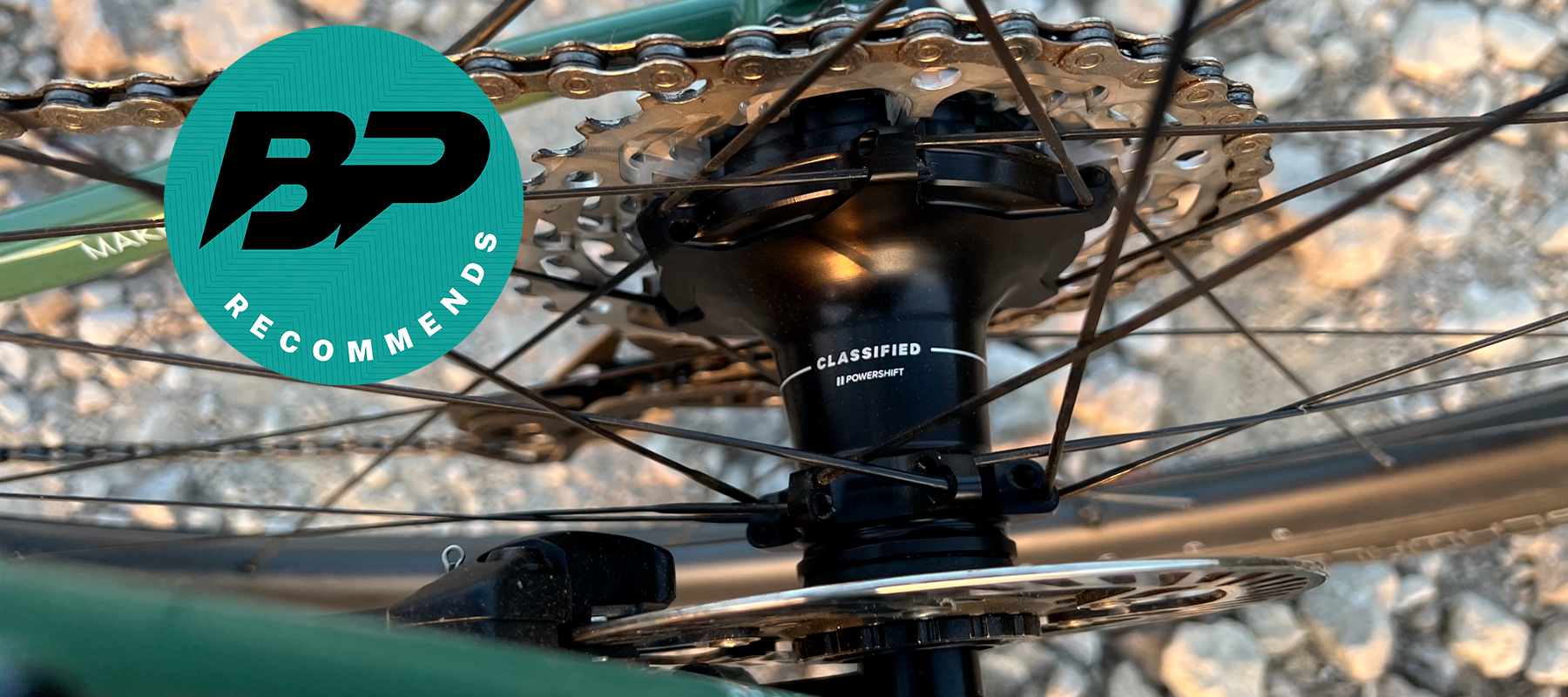Bike Perfect Verdict
Classified’s Powershift hub delivers instant ‘double your gear’ wireless shifts in a light, super neat package while keeping all the single ring wins. Long term reliability is an unknown though and price is extremely high.
Pros
- +
Instant, wireless 1 - 0.7 ratio change shifts
- +
Minimal drag, low weight
- +
Retains all your single chainring wins
- +
Lifetime reliability claims
- +
Campagnolo, SRAM, Shimano and gravel/mtb/road versions
Cons
- -
Very expensive compared to 2x
- -
Bars need drilling
- -
Unproven long term reliability
- -
Through axle-only
Why trust BikePerfect
Classified’s Powershift hub has caused a big stir on the road where’s it’s picked up World Tour race wins and some famous investors. It’s also now available in an MTB format too, but gravel is arguably where it’s combination of potential super wide range with all the advantages of a single chainring set up works best. Mason sent me their superb Exposure bike equipped with Classified hub equipped Hunt Carbon Gravel Race 40 wheels and Campagnolo’s 13-speed Ekar groupset. So I took it deep into the steeps of the Yorkshire Dales to see how it worked out.
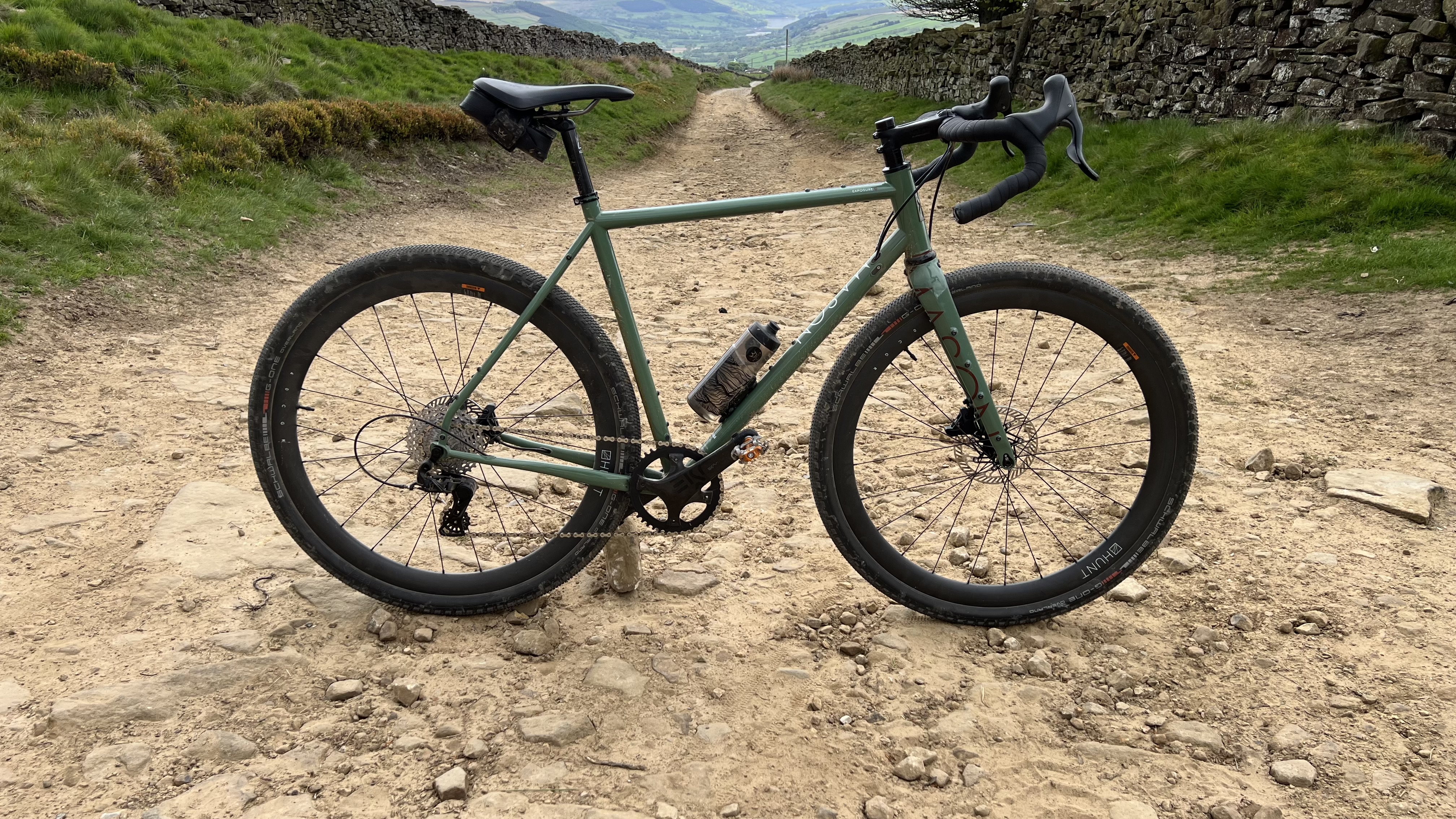
Design
Hub gears have always been a strong utility choice, but they’ve never been considered a performance option. While Classified are close lipped on details, the Powershift hub still uses a refined version of the same sun and planet gear mechanism design as pretty much every internal gear hub of the past century. The clever bit is that the ‘Smart axle’ (142x12mm for road and gravel bikes) includes a wireless receiver and contactless actuator. This ‘speaks’ to the wireless bar end plug style transmitter unit and CR1632 battery holder which is hard wired to a ‘blip’ button you can mount anywhere you want on the bars. Press that and the hub instantly* switches between 1:1 and 1:0.686 transfer ratios – roughly the same as most large to small double chainring setups.
While system weight depends on wheel/hub choice, compared to the Mason Exposure with Ekar and 40CGR wheels I tested previously, the Classified system only adds 262g. For context, a SRAM Force AXS front mech with battery is 182g then you need to add around 40g for the extra chainring and then the weight of however many bolts you need to fix it on. The one piece machined steel Classified Ekar compatible 10-36 block (they only do the one size) is also 100g lighter than the official Campagnolo cassette.
The mechanism itself fits into a slightly oversized rear hub and while Classified do their own wheelset, more and more compatible options are being promised from other wheel brands. Hunt are leading the charge by actually having compatible hub shell versions of their 48 Limitless Aero Disc and 40 Carbon Gravel Race wheels ready in June. The Powershift body also comes in SRAM and Shimano versions and as everything is wireless, it’ll fit almost any through-axle wheeled road/gravel bike. A 148 x 12mm Boost version is also available for MTBs.
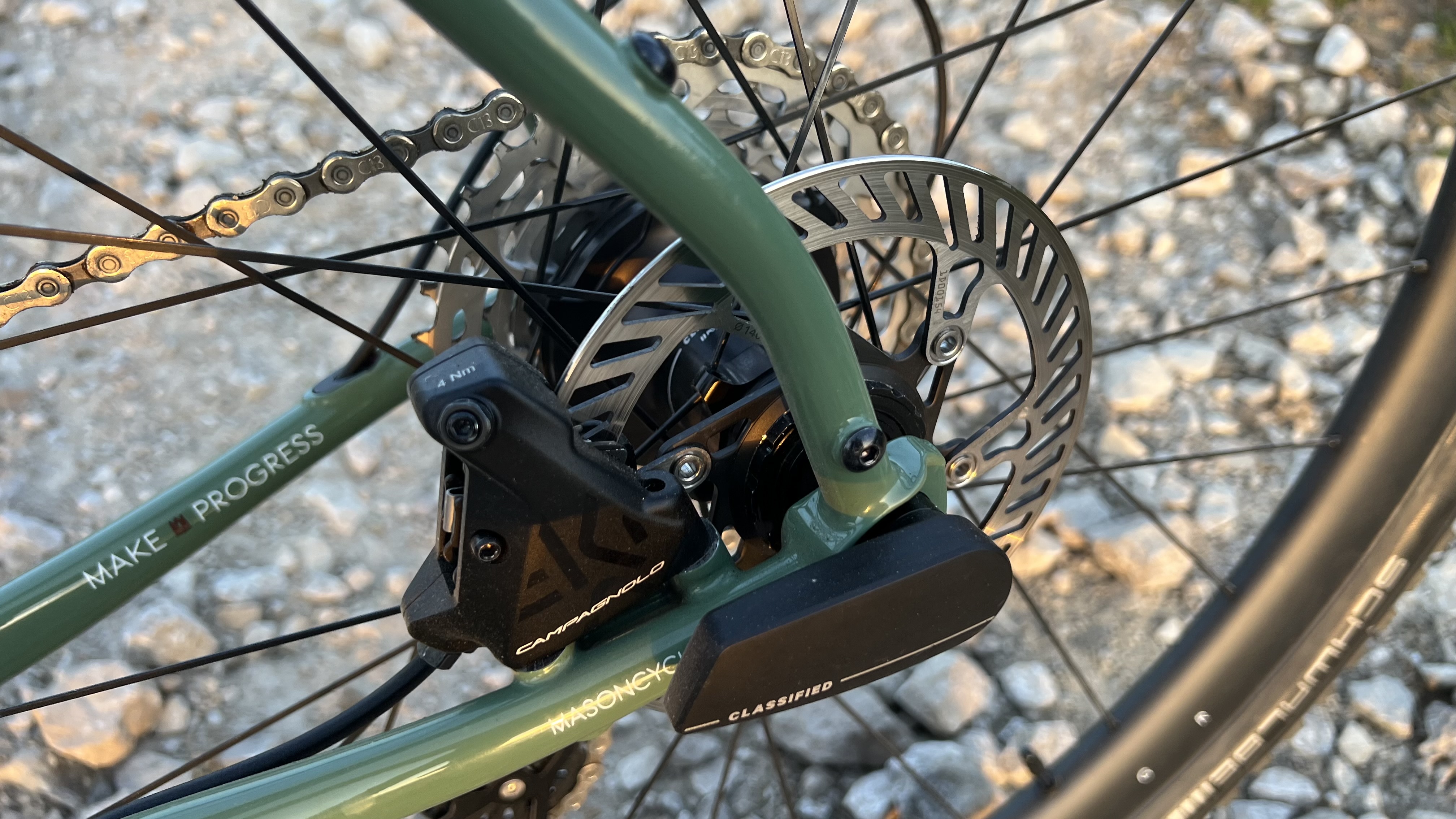
Performance
Let’s not avoid the economic elephant in the room here. While pricing of kit and wheel options seems to vary slightly, the upcharge to add the Powershift hub to a Mason Exposure of otherwise identical spec is £1,199. That’s more than a complete Ekar groupset including brakes if you shop around online and compares to a £40 upcharge for a GRX twin ring over a single ring setup. However ,there’s much more going on than just replicating a double chainset.
For a start it’s an addition rather than an alteration, so if you’re fitting it to an existing bike you don’t have to change the shifters/chain/derailleur etc. Because there’s no messing with the existing transmission beyond installing a new wheel and cassette, the only fitting faff is the need to drill a hole for the ‘blip’ button cable (unless you already have a Di2/wire ready bar or you’re adding it to a Di2 wiring loom).
Once set up, the shifting is truly phenomenal. Classified says the shift takes 150 milliseconds from pressing the button, so that’s essentially instant. In fact, it’s so quick that it takes some time to adjust to your legs suddenly spinning faster and I nearly knee’d the bars on several occasions at first. It’ll still shift up to at least a 1000 watt threshold if things suddenly steepen up or get sprinty. It’ll also shift if the cranks and hub/wheel aren’t turning. That’s great for round town or rapidly changing terrain, but I found it was particularly awesome when I slipped and stopped with a loaded bike that would have been awkward to lift up the rear wheel and pedal/shift to access a suitable starting gear otherwise.
If I was being super picky, the shift into the higher ratio had more of a clunk on my setup to the completely seamless shift to easier, but compared to the slow, often tortuous sounding grind of a front mech setup it’s an entirely different league of instant, silent surety. The Classified cassette shifted just as well, if not better, than official Campagnolo blocks I’ve used too, so the whole setup felt improved. That might not be the case with Shimano or SRAM set ups where 'official’ cassette performance is significantly better than ‘official’ Campagnolo.
While some of the 26-gear spread is so close it’s basically a repeat, the small jumps between cogs is a smooth cadence/efficient pedalling gift compared to a gappy single ring/big cassette set up. Again, that’s something that works really well in the long distance/gravel sphere where gradient/speed changes tend to be less abrupt and with longer lead times than with mountain biking. If you do need extremes of gears, then the 44 tooth chainring, 10-36 tooth cassette Ekar/Classified combo I tried gives a slightly broader range than SRAM’s 43/30 tooth, 10-36 tooth cassette X-Wide twin ring system and is significantly broader than Shimano’s lowest range GRX twinset. With a top gear of 127.3in and bottom gear of 20.7in, it also outreaches a 40Tx 10-52 setup (115.8 to 22.3in range) by a significant chunk at both ends. Using a smaller chainring will obviously give an even smaller crawler gear, but Classified advise sticking with a 40T or larger. That’s because a larger chainring gives a more efficient chain run than a smaller one. And while there will always be some drag in a reducer gear system, I certainly couldn’t feel any even on the smoothest roads – which is a dramatic contrast to the coffee grinder vibe of multi-speed rear hubs I’ve tried like Rohloff.
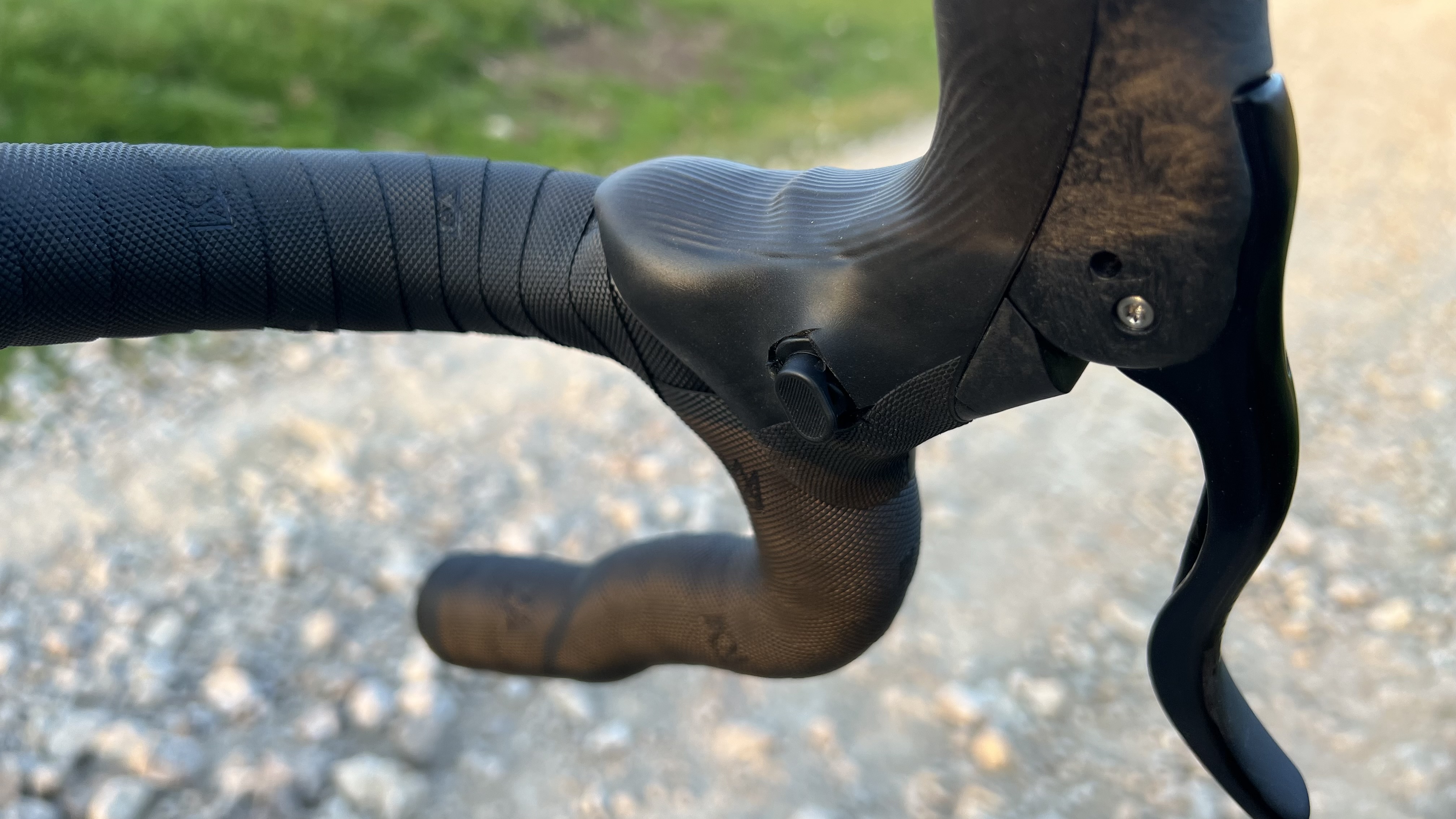
As someone who abandoned front shifters on MTBs way before SRAM made it an official option, and binned off twin rings on road and gravel as soon as possible too, it’s fair to say Classified were preaching to the pre-converted here. The grind, mis-shifts and awkwardness of seemingly every twin ring setup I still encounter on test bikes has done nothing to change that either.
The deeper I rode into the Yorkshire Dales trying (and failing) to find something that would defeat or even slightly disrupt the Powershift bike, the more I appreciated the bigger picture advantages of the system over a conventional twin ring. While the Mason can run rock shrugging 50mm tires with any transmission, many bikes can only fit wider rubber in single ring format. The silent, secure chain action as I borderline abseiled down big rock descents that the Exposure had spun up the other side of effortlessly was a reminder just how good a clutch tamed, alternating tooth shape transmission is compared to the whip and rattle of a twin ringed setup. There’s barely any more weight in the back end of the bike than there would be with a larger cassette, so there’s no tangible dynamic difference either.
According to Classified, the fully sealed hub is designed to be totally maintenance-free apart from usual bearing servicing requirements. In fact, according to them, “the Classified hub has an operational lifespan exceeding the lifespan of a bicycle’s internal systems, and it requires no maintenance.” Having only ridden it for a couple of days I can’t possibly comment on that, and I’ve not found any third party long term reports on the system either. You’re definitely less likely to be able to concoct a big repair or find spares and support for the Powershift compared to a front mech and twin ring setup if something does go wrong a long way from home though.
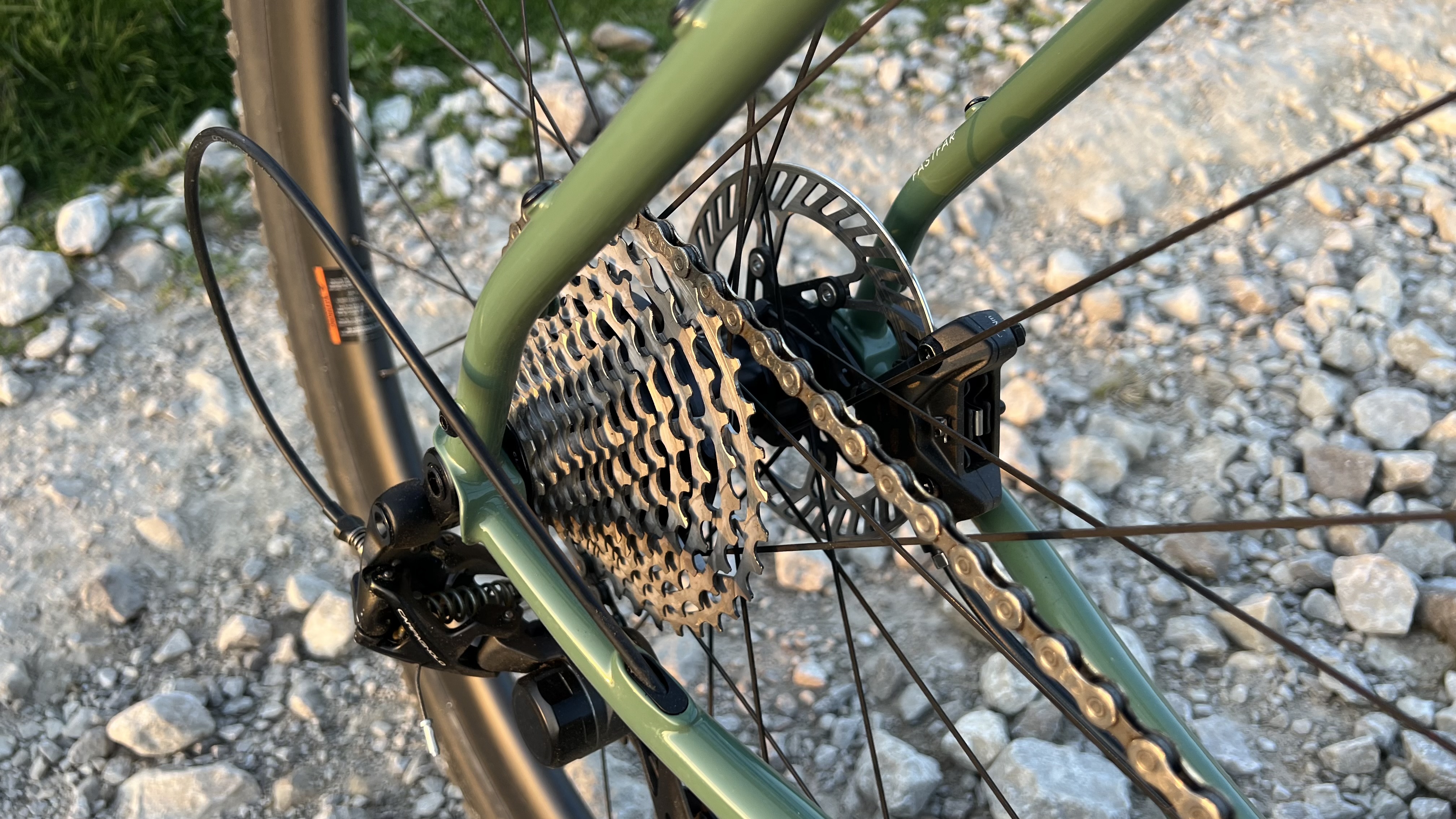
Verdict
There’s no avoiding that the Classified Powershift system is seriously expensive and the audacious reliability claims are so far unproven. In terms of actual instant shift whether sprinting or stationary function though, it’s absolutely fantastic. It genuinely adds bigger terrain/bigger speeds capability without sacrificing subtle ratio changes or losing the wide tire, cleaner look, better efficiency, security, quietness and aero wins of a single ring setup. It’s light, there’s no tangible drag in the reducer gear and it’s in a format that fits almost any modern road/gravel/MTB bike. In other words, if you can afford it and you’re prepared to believe Classified about it’s longevity then it’s a proper Force multiplier (or Rival, Red, GRX, Ekar etc..)
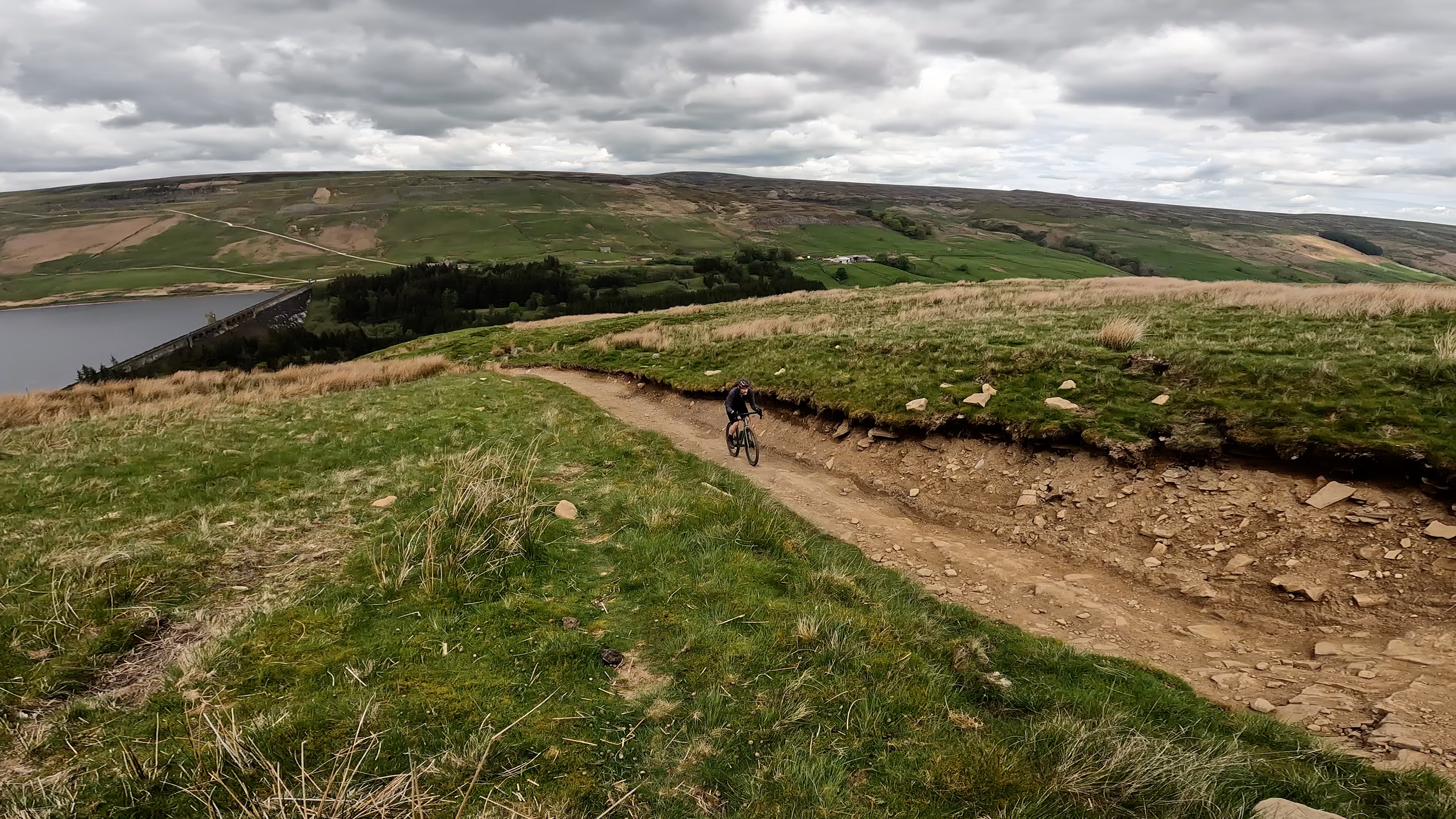
Tech specs: Classified Powershift Campagnolo
- Price: £1,199 (upcharge on Mason Exposure, pricing may vary elsewhere)
- Sizes: 10-36 tooth cassette is currently the only Campagnolo option. Other sizes available for SRAM and Shimano
- Weight: 226g more than standard Ekar/Hunt build, but system weights vary depending on host hub/wheel

Guy Kesteven has been working on Bike Perfect since its launch in 2019. He started writing and testing for bike mags in 1996. Since then he’s written several million words about several thousand test bikes and a ridiculous amount of riding gear. He’s also penned a handful of bike-related books and he reviews MTBs over on YouTube.
Current rides: Cervelo ZFS-5, Specialized Chisel, custom Nicolai enduro tandem, Landescape/Swallow custom gravel tandem
Height: 180cm
Weight: 69kg
